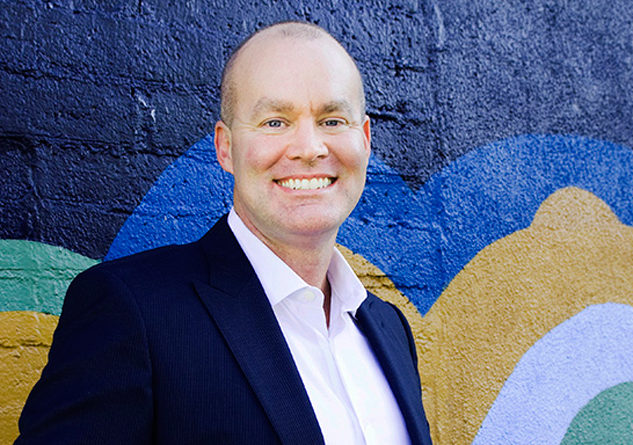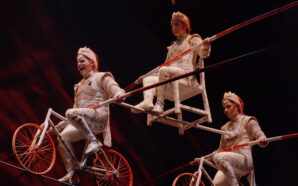Co-Founder Halfdan Hussey breaks down the VR opportunities at Cinequest Film Festival this year and why the festival has impact
Arturo Hilario
El Observador
Halfdan Hussey is the Director, CEO & Co-Founder of Cinequest Film Festival, which is going on until March 11th.
This year brings more than 250 films and experiences to Downtown San Jose and Redwood City, showcased at the various theaters and galleries in the area.
In the following interview Hussey details what the meaning of their theme this year, “Impact”, means to him, highlights the second year of the virtual reality (VR) programs, and breaks down some of the Latino lineup at Cinequest for 2018.
This year’s theme of the film festival is that of “Impact”. Could you give me a rundown on why that term was chosen, and its greater meaning within the festival?
It was chosen because we were asked, as we were thinking about the theme for the year, what is it we’re most proud of? And there’s many things about that but the one [that] I love is, did Cinequest have a positive impact on your life? You can watch movies on Netflix, why would you come to Cinequest to watch a movie? We want you to come because it’s going to have one of the following impacts:
You’re going to see a world or united states premiere most of the time. This is a discovery opportunity, which makes it really exciting. You’re gonna get a chance to access films that are not on Netflix or never will be. These are films that come from around the globe, these are not distributed in the United States. You’re also going to see the top hits coming to Cinequest, that are going to be released soon, but you’re going to see them first. So that’s part of the impact.
The experience of these movies, the reason that I got into the world of art is because personally, and everyone that loves art, you have great experiences that impact your life. You connect to stories, to people, to cultures, to other ways of life that you can relate to or that are so different from yours that you can have an empathetic experience and expand your horizons. So, it’s a very exciting thing, that type of impact with art. And then another type of impact with Cinequest is that you’re with people.
You’re sharing with lots of live people. Both those you came with, or you can come by yourself, or all the people you meet. At gatherings, at parties at meetups, in lines, at theaters. It’s just incredible Cinequest magic, not Disney magic, but Cinequest magic, when you meet and connect with other people.
Meet new friends or have new experiences with old friends. It’s just fantastic and this impact can shape one’s social life, it can be an impact on their career or their work, it can inspire them to do great things or just lift up their hearts.
The technologies have a different type of impact. They’re tools. They’re ways we can access new forms of expression and storytelling.
One thing I’m really proud of in the Cinequest organization and the experiences that we have produced is they have been inclusive from day one without somebody telling us we should be inclusive and the reason being that the people of the Silicon Valley that run Cinequest, that produce it and volunteers etc. are pretty much a cross section of the globe, and the people we serve are as well. And we’re lucky that the film media is utilized by so many cultures and age groups and walks of life.
So that has been a strong suit of ours and we were promoting long before they were fashionable to do such: LGBT cinema and perspectives and lifestyles, again different cultures, not just the ones that are most represented in the Silicon Valley but all of the globe, different age groups, political and social perspectives, you get them all at Cinequest which is great.
A couple of years ago the academy was really attacked because of the lack of representation and celebration of women artists and that year [Cinequest] had over 50% of our films made by women, producers and directors. That has been the case over the last few years, so I’m proud of that. We don’t do it by quota, we just pick the best, and always look and make sure that there is representation for these communities, and it’s very easy for us to find that.
What exciting things are happening this year with the VR portion of the film festival, now in its second year.
Virtual reality is a really great place for Cinequest to make a play because we’ve always been about showcasing both art as well as the technologies that revolutionize and empower artists to create and audiences to have new and better experiences. So, VR, it’s right in line with that because now people can experience both virtual reality cinema and movies as well as other types of virtual reality experiences that are a very high level of content. We started this last year and we were just starting to see top level content for virtual reality at that time and the initial experience was really great for people and we were very encouraged by it, and this year we’re able to do a lot more and we’ve refined our virtual reality an augmented reality experiences.
We will have a cinema called “Virtual Reality Cinema” which will present in Samsung Gear technology, is seven different VR programs, which are very exciting and very eclectic and very dynamic mix of 360 movies from around the globe. Second, we’ll have a virtual reality lounge experience where different forms of VR can be experienced on HTC Vive technologies.
This will be not only movies but interactive cinema, gaming, immersive experiences. What might that mean? Well walking across on a wire between two skyscrapers, and many different experiences in VR. Educational opportunities, experiencing arts in a new way. Going into a gallery like you were there, or even more different, going into the painting and seeing the world inside of the painting, as if you were there. So, it’s an exciting time for this. We don’t know where VR is going to lead, what’s going to stick, what’s going to work, but we know it’s really thrilling right now, and some of it’s going to be adapted.
Is there any of these programs that come to mind that you would specifically recommend, a “must-not-miss” opportunity, if you will?
Well I think for a really fun one, “The Humanity Bureau” is a great sci-fi virtual reality, and it has a couple of big stars in it including Nicholas Cage whose one of our Maverick Tribute Spirit guests this year, and I love this one. Another one is “Allumette”, which is an incredible animation. And I’ll use those two as examples because VR has really been cooking in animation, and animation works great because you can create a world all around somebody and change that world in animation.
It really works spectacularly well in VR. live-action storytelling is a greater challenge, because when you make a two-dimensional movie on a flat screen you’re able to put the equipment behind you. People don’t see that, they see the images and you have a film language that’s already established for flat screens, it’s called D.W. Griffith’s film language which 99.9% of films use, and audiences are used to that language. Oh, you cut to this, you cut to that, it equates to expression.
But now with virtual reality the cameras are pointing everywhere, how do you do that? How do you choreograph the actors and the storytelling? How do you cut between longshots and close-ups, and then how do you draw a person’s attention to what you want them to see? A movie director in classic Griffith language wants you to focus on one actor and not look at the other by closing up on the actor’s face. But now how do you do that in VR?
I don’t know where the [viewer] will look. They might look up, down, left or right. Some of it can be done through audio cues so there’s a lot of exciting challenges. So, I bring up the “The Humanity Bureau” because they made it work. They staged and choreographed the episodic filmmaking in a way that’s fantastic.
For this last portion, we would love for you to highlight the Latino centric films and projects that will be at Cinequest this year.
“Adios Amor” is a big standout. Maria Moreno might not be as famous as Cesar Chavez, but she had a major impact. She was a mother of 10-12 children who was also a leader of workers and political activists. An incredible life story, and I think it is wonderful that this film, a USA premiere, really shines a light on what an incredible person she was, as well as leader. We were speaking about women earlier, and here’s this incredible Latina leader who we’re excited to help showcase her work more.
We have a really fun movie that’s from Mexico that’s called “Cygnus”, a sci-fi and “twilight zoneish” type of film. If you want something more poignant on current topics, “Hermanos” is wonderful because it parallels Mexican brothers as well as another group of siblings in the United States, both dealing with similar issues with immigration and other current day items. A really terrific documentary.
Another one, “Help Me Make it through the Night”, is a very powerful family movie from Mexico. It’s interesting because a large percentage of our community speaks Spanish or is Latino and we have always had an incredible and powerful Spanish language lineup and we have an audience that reflects the makeup of our community as well.
In the first era of Cinequest we would see our Latino audience gravitating to our Latino showcase, and now we see our Latino audience gravitating more to just a more international mix of films in general; with a love also of the Spanish language films we’re bringing. I like that because I think it shows that Cinequest has established itself as an inclusive experience for people from all walks of life, coming not only to experience its own culture but a cross-section of the globe.
Cinequest Film Festival is happening now in Downtown San Jose and Redwood City. More details available at Cinequest.org.






